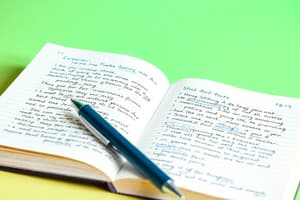Podcast
Questions and Answers
What is the primary goal of study notes?
What is the primary goal of study notes?
- To summarize key facts and concepts (correct)
- To create lengthy essays
- To include all text verbatim
- To provide recommendations for additional reading
Which of the following formats is commonly used for effective study notes?
Which of the following formats is commonly used for effective study notes?
- Bullet point lists (correct)
- Long paragraphs
- Freeform writing
- Narrative essays
Which factor does NOT affect the quality of note-taking?
Which factor does NOT affect the quality of note-taking?
- Time of day when notes are taken (correct)
- Knowledge level on the topic
- Quality of the source material
- Reading comprehension skills
What is an effective method for reviewing study notes?
What is an effective method for reviewing study notes?
Which of the following is a common error in note-taking?
Which of the following is a common error in note-taking?
What is an advantage of using diagrams and charts in note-taking?
What is an advantage of using diagrams and charts in note-taking?
What should be included in effective study notes?
What should be included in effective study notes?
Which note-taking strategy involves testing yourself on material?
Which note-taking strategy involves testing yourself on material?
Flashcards
Study Notes
Study Notes
Concise summaries of key information, focusing on clarity and brevity.
Effective Study Notes
Effective Study Notes
Concise, factual, organized, easy-to-understand notes for review and recall.
Note-Taking Strategies
Note-Taking Strategies
Methods like active recall, summarization, and spaced repetition to improve learning and remembering.
Note Organization
Note Organization
Signup and view all the flashcards
Note Review
Note Review
Signup and view all the flashcards
Common Note-Taking Errors
Common Note-Taking Errors
Signup and view all the flashcards
Note-Taking Importance
Note-Taking Importance
Signup and view all the flashcards
Note-Taking Quality Factors
Note-Taking Quality Factors
Signup and view all the flashcards
Study Notes
Introduction to Study Notes
- Study notes are concise summaries of information.
- They focus on key facts and concepts.
- They aim for clarity and brevity.
- They use a structured format, like bullet points.
- They present factual information.
- They are designed for easy review.
Key Characteristics of Effective Study Notes
- Concise and to the point.
- Factual and accurate.
- Organized and well-structured.
- Easy to understand.
- Useful for review and recall.
Types of Study Note Formats
- Bullet point lists are common and effective.
- Outlines with headings and subheadings can organize complex topics.
- Diagrams and charts are useful for visualizing data.
How to Create Effective Study Notes
- Read the material carefully and actively.
- Identify main ideas and supporting details.
- Summarize the key concepts in your own words.
- Use abbreviations and symbols (where appropriate) to save time and space.
- Periodically review and revise your notes.
- Ensure notes are consistent with the subject matter.
Factors Affecting Note-Taking Quality
- Quality of the source material (accuracy and clarity)
- Reading comprehension skills (understanding the material)
- Knowledge level (prior knowledge in the topic)
Using Note-Taking Strategies
- Active Recall: Testing yourself on the material.
- Summarization: Condensing large amounts of text.
- Spaced Repetition: Reviewing material at increasing intervals.
How to Organize Study Notes
- Structure logically (chronological, thematic, etc.).
- Use headings and subheadings for clarity.
- Color-coding can be effective.
Reviewing Study Notes
- Regular review strengthens memory and retention.
- Review notes periodically to reinforce concepts.
- Use flashcards or other memory aids to review.
Avoiding Common Note-Taking Errors
- Copying information verbatim without understanding.
- Not organizing notes logically.
- Not summarizing information effectively.
- Taking excessive notes that are too detailed.
Importance of Note-Taking for Learning
- Improves understanding and retention.
- Aids in comprehension and recall of material.
- Helps with problem-solving and critical thinking.
- Provides a foundation for further study.
Creating Useful Study Note Templates
- Consistent template helps with organization.
- Examples of templates include outlining, Cornell, mind mapping.
Note-Taking Tips for Different Learning Styles
- Visual learners can benefit from diagrams and charts.
- Auditory learners can benefit from verbal summaries.
- Kinesthetic learners can benefit from writing and rewriting their notes.
Time Management Strategies
- Schedule time for note-taking.
- Break down tasks (if necessary)
- Prioritize topics (if applicable)
Studying That Suits You
Use AI to generate personalized quizzes and flashcards to suit your learning preferences.




